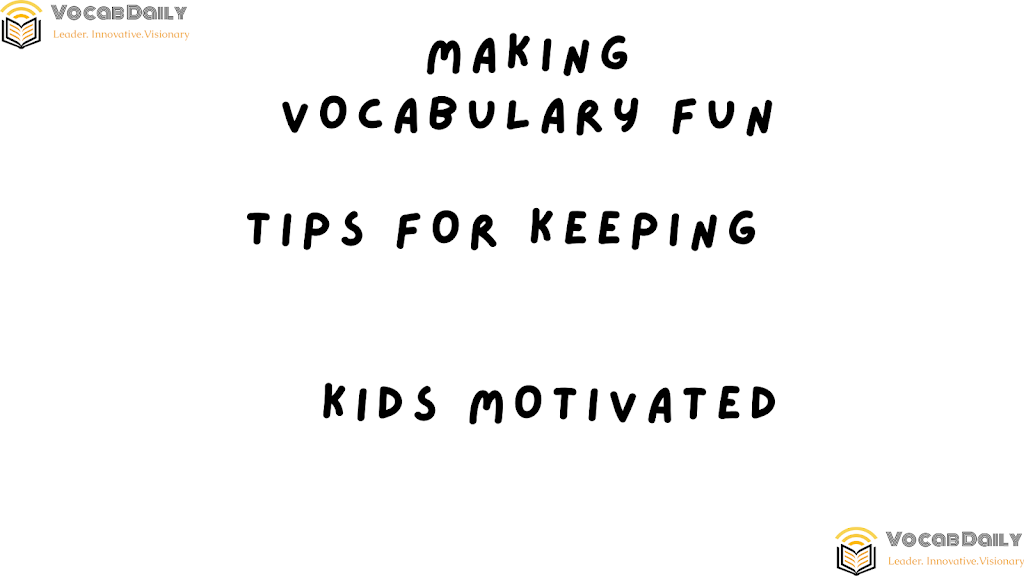Making Vocabulary Fun: Tips for Keeping Kids Motivated
Vocabulary development is a crucial aspect of language learning and academic success. However, keeping children engaged and motivated to learn new words can be challenging. This article explores effective strategies to make vocabulary learning enjoyable and exciting for kids, ensuring they stay motivated throughout their language journey.
Interactive Word Games
One of the most effective ways to make vocabulary fun is through interactive word games. These games not only entertain children but also reinforce their learning in an engaging manner. Consider incorporating games like Scrabble, Boggle, or digital apps like Wordscapes into your vocabulary lessons. These games challenge kids to think creatively about words, their meanings, and their usage in different contexts.For younger children, simpler games like word bingo or memory matching games with vocabulary cards can be equally effective. These games help associate new words with visual cues, making them easier to remember. You can also create custom games tailored to the specific vocabulary set you’re teaching, ensuring that the learning is targeted and relevant.
Storytelling and Role-Playing
Storytelling is a powerful tool for vocabulary enrichment. Encourage children to create stories using new vocabulary words, or incorporate new words into familiar tales. This approach not only helps children understand the meaning of words but also how to use them in context. Role-playing scenarios can further enhance this learning experience. For instance, you could set up a mock restaurant where children have to use food-related vocabulary to order meals or describe dishes.Consider organizing regular storytelling sessions where children take turns to narrate tales using a set of predetermined vocabulary words. This activity not only improves their vocabulary but also enhances their creativity and public speaking skills.
Visual Aids and Mind Maps
Visual learners can benefit greatly from the use of visual aids in vocabulary instruction. Create colorful mind maps or word webs that illustrate relationships between words and their meanings. For example, you could create a mind map centered around the word “happy,” branching out to related words like “joyful,” “ecstatic,” and “content.”Encourage children to create their own visual representations of new words. This could involve drawing pictures, creating collages, or even making short videos to explain word meanings. These activities not only make learning more enjoyable but also help in better retention of new vocabulary.
Vocabulary Journals and Personal Dictionaries
Empower children to take ownership of their vocabulary learning by encouraging them to maintain vocabulary journals or personal dictionaries. These can be physical notebooks or digital documents where children record new words they encounter, along with their definitions, example sentences, and even illustrations.Make this activity more engaging by allowing children to decorate their journals or create themed sections. You could also introduce a “Word of the Day” challenge, where children compete to find and share the most interesting new word they’ve learned.
Technology and Multimedia Integration
In today’s digital age, leveraging technology can significantly enhance vocabulary learning. Utilize educational apps, online quizzes, and interactive vocabulary websites to supplement traditional learning methods. Many of these digital tools offer gamified learning experiences, making vocabulary acquisition feel more like play than work.
Consider creating multimedia projects around vocabulary themes. For instance, children could make short videos explaining new words, create digital flashcards, or even develop their own vocabulary quiz games using platforms like Kahoot!
By implementing these fun and engaging strategies, you can transform vocabulary learning from a mundane task into an exciting adventure for kids. Remember to vary your approaches and tailor activities to suit different learning styles and age groups.
For more innovative vocabulary learning resources and strategies, visit www.https://vocabdailyofficial.blogspot.com/. Additionally, explore our comprehensive vocabulary workbook available at https://shorturl.at/0a0Qc to further support your child’s language development journey.


Leave a Reply